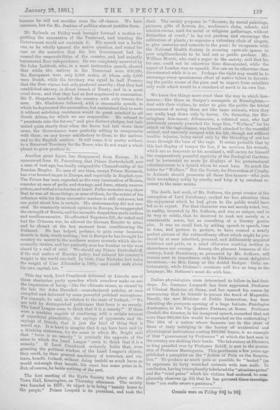Another great figure has disappeared from Europe. It is announced
from St. Petersburg, that Prince Gortschakoff, now a man of vast ago, has finally resigned the Chancellorship of the Russian Empire. No man of our time, except Prince Bismarck, has ever loomed larger in Europe, and especially in English eyes. The Prince has been regarded as the very incarnation of Russia, a master at once of guile, and strategy, and force, utterly unscru- pulous, and withal a barbarian at heart. Fuller memoirs may show that he was all those things, or none of thorn, for the extent of his influence with his three successive masters is still unknown, but one point about him is certain. His statesmanship did not suc- ceed. He constantly mistook opinion in Europe, he exaggerated the strength of Russia, and his sarcastic despatches made endless -and needless enemies. He affronted Napoleon III., he risked and lost the Crimean war, he allowed the German Empire to arise, and he shrank at the last moment from overthrowing the Sultanet. fie has helped, perhaps, to gain some immense deserts in Asia, worth nothing ; but in Europe he has brought his country no nearer to the southern waters towards which she in- cessantly strains, and has patiently seen her frontier on the west closed by a wall o.f steel. We should say Prince Gortschakoff, if the real author of Russian policy, had reduced his country's weight in the world one-half. In 1848, Czar Nicholas had twice the weight of Czar Alexander in 1880,—and could walk about his own capital, too.






































 Previous page
Previous page